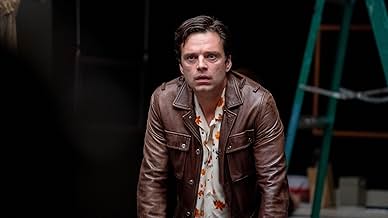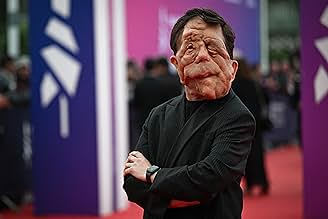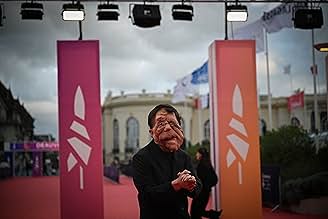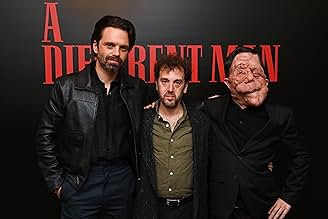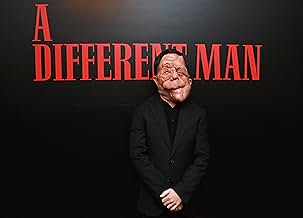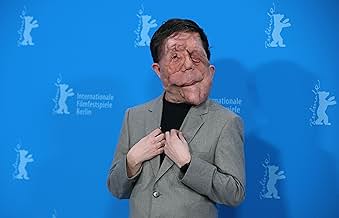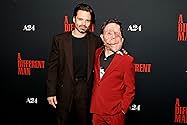अपनी भाषा में प्लॉट जोड़ेंAn aspiring actor undergoes a radical medical procedure to drastically transform his appearance, but his new dream face quickly turns into a nightmare.An aspiring actor undergoes a radical medical procedure to drastically transform his appearance, but his new dream face quickly turns into a nightmare.An aspiring actor undergoes a radical medical procedure to drastically transform his appearance, but his new dream face quickly turns into a nightmare.
- 1 ऑस्कर के लिए नामांकित
- 10 जीत और कुल 60 नामांकन
Corey R. Taylor
- Luther
- (as Corey Taylor)
फ़ीचर्ड समीक्षाएं
"A Different Man," directed by Aaron Schimberg, sets out to explore the unsettling relationship between identity, appearance, and self-acceptance, taking the audience on a strange and, at times, uncomfortable journey through the illusions we create to feel accepted. With a style that flirts with dark humor and existential drama, the film stands out for its peculiar approach and the way it subverts expectations, refusing to deliver a redemptive or simplistic narrative. Sebastian Stan, known for his roles in blockbusters, once again steps out of his comfort zone and takes on a role that demands not only a physical transformation but also a deep dive into a character full of contradictions and vulnerabilities.
Stan plays Edward, a man with a severe facial disfigurement who dreams of becoming an actor, but whose lack of talent is as evident as his insecurity. The story gains strength by presenting Edward not as a stereotype of perseverance or inspiration, but as someone genuinely flawed-pathetic even-whose pursuit of aesthetic change is born from misguided ambition and repressed vanity. Schimberg's script succeeds in portraying Edward in a raw, unfiltered way, without resorting to easy sentimentalism. And Stan, even buried under layers of prosthetic makeup, delivers a sensitive and nuanced performance, capturing the essence of a man torn between the desire to be accepted and the inability to accept himself.
Visually, the film evokes a retro charm, with Super 16mm cinematography giving it a grainy texture and a nostalgic color palette reminiscent of urban dramas from past decades. The dense atmosphere of New York, with its worn-out streets and claustrophobic apartments, adds to the protagonist's sense of isolation and displacement. The visual style complements the subtly absurd tone of the narrative, which at times feels reminiscent of early Woody Allen films, with snappy dialogue and tragicomic situations that shift between the melancholic and the ridiculous.
The dynamic between Edward and Ingrid, played by the charismatic Renate Reinsve, adds an interesting layer to the story. Ingrid is a Norwegian playwright who moves into Edward's building with grand ambitions but carries her own insecurities as well. Reinsve delivers a magnetic performance, balancing her character's charm with a latent selfishness that keeps the audience constantly guessing about her true intentions. Their relationship unfolds in unexpected ways, oscillating between companionship and opportunism, revealing how both feed off each other's vulnerabilities.
The story takes a major turn when Edward, after undergoing a radical surgery that makes him "conventionally attractive," decides to reinvent himself as Guy, a real estate agent. This is where the film delves even deeper into the idea that appearance is just a superficial layer of identity. Even free of his old face, Edward still carries the same timid gestures, the same almost childlike insecurity, and Stan, with precise body language, brilliantly conveys this continuity. One of the film's standout scenes is an awkward encounter in a bar bathroom, where despite his new look, he still feels out of place and inadequate.
The introduction of Oswald (Adam Pearson) expands the discussion on identity and self-perception. Pearson delivers a captivating and charismatic performance, providing a stark contrast to Edward's character. Oswald, who has the same facial condition Edward once had, is confident, magnetic, and genuinely comfortable in his own skin-something Edward never managed to be. Oswald's presence acts almost like an inverted mirror, an unsettling reminder that the transformation Edward sought might never have been purely external. The chemistry between Stan and Pearson is one of the film's highlights, with dialogues filled with tension and a competitive energy, as Edward sees in Oswald everything he wished to be but never could.
The soundtrack adds an extra layer of irony and melancholy to the film, punctuating Edward's journey with tones that swing between dramatic and tongue-in-cheek. The music never underestimates the audience, suggesting complex emotions without forcing them, reinforcing the film's ambiguous tone, which never fully commits to drama or humor.
Overall, "A Different Man" doesn't offer easy answers or comfortable resolutions. The takeaway is that external transformation might change how others see us, but it doesn't necessarily alter how we see ourselves. Schimberg navigates this reflection with intelligence and a touch of provocation, questioning what truly defines our identity and how desperately we seek external validation. It's a film that unsettles, entertains, and, above all, makes you think-without ever falling into clichés or simplistic solutions.
Stan plays Edward, a man with a severe facial disfigurement who dreams of becoming an actor, but whose lack of talent is as evident as his insecurity. The story gains strength by presenting Edward not as a stereotype of perseverance or inspiration, but as someone genuinely flawed-pathetic even-whose pursuit of aesthetic change is born from misguided ambition and repressed vanity. Schimberg's script succeeds in portraying Edward in a raw, unfiltered way, without resorting to easy sentimentalism. And Stan, even buried under layers of prosthetic makeup, delivers a sensitive and nuanced performance, capturing the essence of a man torn between the desire to be accepted and the inability to accept himself.
Visually, the film evokes a retro charm, with Super 16mm cinematography giving it a grainy texture and a nostalgic color palette reminiscent of urban dramas from past decades. The dense atmosphere of New York, with its worn-out streets and claustrophobic apartments, adds to the protagonist's sense of isolation and displacement. The visual style complements the subtly absurd tone of the narrative, which at times feels reminiscent of early Woody Allen films, with snappy dialogue and tragicomic situations that shift between the melancholic and the ridiculous.
The dynamic between Edward and Ingrid, played by the charismatic Renate Reinsve, adds an interesting layer to the story. Ingrid is a Norwegian playwright who moves into Edward's building with grand ambitions but carries her own insecurities as well. Reinsve delivers a magnetic performance, balancing her character's charm with a latent selfishness that keeps the audience constantly guessing about her true intentions. Their relationship unfolds in unexpected ways, oscillating between companionship and opportunism, revealing how both feed off each other's vulnerabilities.
The story takes a major turn when Edward, after undergoing a radical surgery that makes him "conventionally attractive," decides to reinvent himself as Guy, a real estate agent. This is where the film delves even deeper into the idea that appearance is just a superficial layer of identity. Even free of his old face, Edward still carries the same timid gestures, the same almost childlike insecurity, and Stan, with precise body language, brilliantly conveys this continuity. One of the film's standout scenes is an awkward encounter in a bar bathroom, where despite his new look, he still feels out of place and inadequate.
The introduction of Oswald (Adam Pearson) expands the discussion on identity and self-perception. Pearson delivers a captivating and charismatic performance, providing a stark contrast to Edward's character. Oswald, who has the same facial condition Edward once had, is confident, magnetic, and genuinely comfortable in his own skin-something Edward never managed to be. Oswald's presence acts almost like an inverted mirror, an unsettling reminder that the transformation Edward sought might never have been purely external. The chemistry between Stan and Pearson is one of the film's highlights, with dialogues filled with tension and a competitive energy, as Edward sees in Oswald everything he wished to be but never could.
The soundtrack adds an extra layer of irony and melancholy to the film, punctuating Edward's journey with tones that swing between dramatic and tongue-in-cheek. The music never underestimates the audience, suggesting complex emotions without forcing them, reinforcing the film's ambiguous tone, which never fully commits to drama or humor.
Overall, "A Different Man" doesn't offer easy answers or comfortable resolutions. The takeaway is that external transformation might change how others see us, but it doesn't necessarily alter how we see ourselves. Schimberg navigates this reflection with intelligence and a touch of provocation, questioning what truly defines our identity and how desperately we seek external validation. It's a film that unsettles, entertains, and, above all, makes you think-without ever falling into clichés or simplistic solutions.
I was not sure when to laugh or look pensive while watching A Different Man but I went with the audience and laughed when they did and thought when they did. Although I'm not sure I agree we should have laughed when we did because the story is of identity crisis above anything else. In this film, a man with facial deformities assumes another life after a successful surgery but is overwhelmed by what his new life is failing to give him and what the old life in hindsight gave him. It's a surreal experience where you will end up thinking about your own life should given a chance to change it and reborn as a new man. A Different Man shows that changing to another person looks good but it's the case of grass is greener on the other side. Sebastian Stan is adorable here.
(Watched at the 2024 MAMI Mumbai Film Festival.)
(Watched at the 2024 MAMI Mumbai Film Festival.)
Simply put, it just feels like a cheap shot when the film begins by presenting the undeniable struggles of the main character's life and has him pursue a cure for completely understandable reasons - and then effectively turns around and says "Actually, all of the problems in his life were his fault, he didn't really get better in ways which matter after that, and let us present a totally idealized version of someone with the exact same condition to prove why."
"Accept yourself for who you are and do not seek external fixes" message might come from the right place, but it is not so inspiring when his condition was effectively shown interfering with something as important as his eyesight and generally affect his quality of life even when nobody was watching.
Furthermore, this film also exhibits the same contrivance which brought down Challengers for me - the insistence that like a duckling, the lead MUST imprint onto the first remotely meaningful relationship shown in the narrative and fail to form anything offscreen even when all the conditions are there for it. It is worse here when that relationship effectively comes from a combination of pity and fetishism - as the film is at least honest enough to acknowledge.
For all of that, the first half is very strong in its depiction of the grime of main character's life, reinforced in a variety of unusual ways like the PSA he is part of. Even the second half has enough neat moments - whether in digging down to the details of stage productions or other smaller twists and turns - to avoid ever feeling like a total loss.
I suppose one reason I'm so disappointed is because this could have been a remarkable narrative of a climber who benefited from the system (in this case, the research breakthrough turning him into "A Different Man") only to pull up the ladder behind him for entirely selfish reasons. Instead, the film pretends the climb was never worth it in the first place and stalls around various meta layers instead of developing the point.
"Accept yourself for who you are and do not seek external fixes" message might come from the right place, but it is not so inspiring when his condition was effectively shown interfering with something as important as his eyesight and generally affect his quality of life even when nobody was watching.
Furthermore, this film also exhibits the same contrivance which brought down Challengers for me - the insistence that like a duckling, the lead MUST imprint onto the first remotely meaningful relationship shown in the narrative and fail to form anything offscreen even when all the conditions are there for it. It is worse here when that relationship effectively comes from a combination of pity and fetishism - as the film is at least honest enough to acknowledge.
For all of that, the first half is very strong in its depiction of the grime of main character's life, reinforced in a variety of unusual ways like the PSA he is part of. Even the second half has enough neat moments - whether in digging down to the details of stage productions or other smaller twists and turns - to avoid ever feeling like a total loss.
I suppose one reason I'm so disappointed is because this could have been a remarkable narrative of a climber who benefited from the system (in this case, the research breakthrough turning him into "A Different Man") only to pull up the ladder behind him for entirely selfish reasons. Instead, the film pretends the climb was never worth it in the first place and stalls around various meta layers instead of developing the point.
I found 'A Different Man' a very tough movie to get my head around just whether I enjoyed it or not. On the one hand I found it interesting and I was always curious what would happen next and how it would conclude. On the other hand, I rarely liked the choices it did make next and didn't love the way it did conclude.
I get the message the movie is trying to get across, but I'm not sure this was the way to hammer it home. I get that imposter syndrome is a real thing, but this seemed a little bit ludicrous and hard to buy into. But perhaps that's the point?
It is a very interesting film to look at though. The acting is great and it is shot in a lot of really interesting ways. There's also a grittiness about it that keeps you on your toes and has you unsure what is around the next corner. I'm really torn on this one, but I'll settle on 6.5/10.
I get the message the movie is trying to get across, but I'm not sure this was the way to hammer it home. I get that imposter syndrome is a real thing, but this seemed a little bit ludicrous and hard to buy into. But perhaps that's the point?
It is a very interesting film to look at though. The acting is great and it is shot in a lot of really interesting ways. There's also a grittiness about it that keeps you on your toes and has you unsure what is around the next corner. I'm really torn on this one, but I'll settle on 6.5/10.
What I assume will be a breakout film for Aaron Schimberg, "A Different Man" explores a particular set of emotions that are attached to self-confidence while portraying the short-sided effects of instant gratification. The story provides reason to escape our imperfections until we notice someone living confidently with them. Sebastian Stan is remarkable and transformative in the role of Edward; both physically in the way that he adapts himself to the environment of constant stares and apathetic connection, and also internally with the gradual evolution of his mental complexities. Visually, the film has a 70s noir texture which is complementary to the indie aesthetic of New York City, and with flavors of drama and psychological horror, every sequence is a step in the dark and even more so with the thunderous, and at times, frightening sound design. This is such a unique project that will continue unraveling its mysteries as more people get the chance to see it.
क्या आपको पता है
- ट्रिवियाThe picture of Edward and his mother on Edward's apartment wall is an actual picture of Sebastian Stan and his mother.
- कनेक्शनFeatures Cyrano de Bergerac (1950)
- साउंडट्रैकOld Time Cat-O'-Nine
Written by The Lord Invador (as Rupert Grant)
Performed by The Lord Invador (as Lord Invader)
Courtesy of Shanachie Entertainment
License by Arrangement with Fine Gold Music
टॉप पसंद
रेटिंग देने के लिए साइन-इन करें और वैयक्तिकृत सुझावों के लिए वॉचलिस्ट करें
- How long is A Different Man?Alexa द्वारा संचालित
विवरण
- रिलीज़ की तारीख़
- कंट्री ऑफ़ ओरिजिन
- भाषा
- इस रूप में भी जाना जाता है
- Un hombre diferente
- फ़िल्माने की जगहें
- उत्पादन कंपनियां
- IMDbPro पर और कंपनी क्रेडिट देखें
बॉक्स ऑफ़िस
- US और कनाडा में सकल
- $6,54,254
- US और कनाडा में पहले सप्ताह में कुल कमाई
- $49,466
- 22 सित॰ 2024
- दुनिया भर में सकल
- $15,10,108
- चलने की अवधि1 घंटा 52 मिनट
- रंग
- पक्ष अनुपात
- 1.85 : 1
इस पेज में योगदान दें
किसी बदलाव का सुझाव दें या अनुपलब्ध कॉन्टेंट जोड़ें






